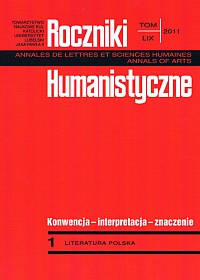Realizm nie-magiczny – o opowiadaniach Stefana Kisielewskiego
Abstrakt
Stefan Kisielewski (1911-1991) is, which is seldom remembered, the author of five preserved short stories written during World War II or in the years that immediately followed it. In these works – written at the beginning of his writing career – he shows the techniques that were to be developed in his later works. Among them the following ones come to the foreground: the intermediate form of reported speech and shocking the reader with descriptions of ugliness, often with the use of the synesthesia coming from the Young Poland movement. The protagonists are motivated by the will to defend – either their own lives, or the achievements of all the previous generations and the humanist values. The protagonists of the stories are people who in the face of the experience of war were forced by the fate – like in the ancient drama – to make difficult moral choices and to define their attitude towards their community. Irrespective of whether their choice is heroic or despicable, it always has a tragic ending. The picture of Poles, Germans and Jews presented in the stories is far from the stereotypes functioning in the 1940s, whereby the later literary and film productions devoted to World War II are heralded.
Copyright (c) 2011 Roczniki Humanistyczne

Utwór dostępny jest na licencji Creative Commons Uznanie autorstwa – Użycie niekomercyjne – Bez utworów zależnych 4.0 Międzynarodowe.





